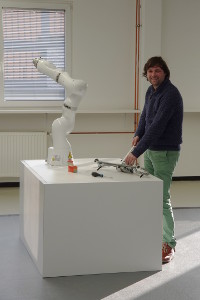| Organisers |
Dr. Yannick Morel and M.Sc., Arne Peters |
| Module |
IN0012, IN2106 |
| Type |
Bachelors / Master Practical Course |
| Semester |
Summer 2017 |
| ECTS |
Bachelor: 10.0; Master: 10.0 |
| SWS |
Bachelor: 6; Master: 6.0 |
| Preliminary Talk |
Thursday 2nd February, 14:00 in MI 03.07.011. |
| Time and Location |
Schleißheimer Str. 90a, time: to be announced |
| Participation |
Matching system + meeting with advisor (please contact Arne for an appointment!) |
News
Learning Outcomes
The course will offer an overview of motion planning and control of robotic manipulators. In it's first half we will give an overview and do practical implementation for efficient path planning for high dimensional configuration spaces and unknown environments, such as the D* algorithm, Rapidly Exploring Random Trees (RRT) or Dynamic Roadmaps. We will also take a look on effictient strategies and datastructures for collision prediction (e.g. KD- or Cover-Trees).
The second half will provide an occasion to develop modern, model-based, dynamic controllers for robotic manipulators, spanning the entire spectrum from theoretical modeling and analysis, to numerical simulation, implementation on hardware available at the host laboratory (ABB IRB 120 or KUKA LBR iiwa), and up to experimental testing. Modeling will be pursued using a Lagrangian approach. Control techniques considered will allow the development of variable-impedance solutions (lower-torque controllers), and of cognitive algorithms providing automatic adjustments to load variations, ensuring uniform tracking performance (i.e. positioning precision) for the considered range of admissible loads, in spite of a low-torque control scheme.
Prerequisites
The course aims at students in their late Bachelor (4th semester or higher), as well as early Masters students.
You should be self-motivated, creative and able to work as part of a team. You should be familiar with robotics (e.g. have taken a course on robotics or have practical experience). You should bring basic technical knowledge about:
- C++
- ROS
- Ubuntu / Linux
- Common Libraries like PCL, OpenCV, Eigen
Furthermore, you should have experience with at least one of the following:
- Dynamics and Control
- Solving Inverse Kinematics
- Processing Depth Images and/or Point Clouds
- Path Planning
Material
- Choset, Howie M. Principles of robot motion: theory, algorithms, and implementation. MIT press, 2005.
- Kunz, T., Reiser, U., Stilman, M., & Verl, A. Real-Time Path Planning for a Robot Arm in Changing Environments. [ PDF ]
